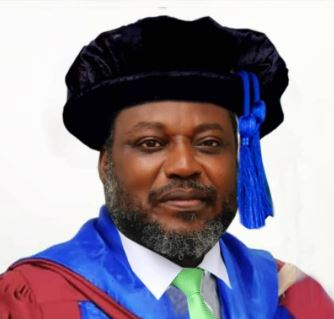
By Victor Otigbu
Professor Babatunde Bolaji Benard, the Senior Special Assistant to the Secretary to the Government of the Federation, George Akume, has been pronounced Africaʼs first Professor of Radioecology by the International Atomic Energy Agency.
This monumental achievement, according to a statement on Sunday, not only celebrates Babatunde’s dedication and brilliance, but also signals Africaʼs growing prominence in scientific research, especially in nuclear science and environmental safety.
According to the statement, Babatundeʼs journey into the world of radioecology is nothing short of remarkable, hence his celebration of the feat.
It read, “After obtaining a BSc in Zoology and an MSc in Ecology and Environmental Biology from the prestigious University of Ibadan, Babatunde earned a PhD in Radiometric Assessment of Pollution Trends in the Niger Delta through a Split-Side Commonwealth Scholarship at Lancaster University in the UK and the University of Port Harcourt. It was this journey that ignited his path as a trailblazing radioecologist.
“In 2008, Professor Babatunde led a project that would transform the landscape of scientific research in Africa. Alongside his team, he successfully secured a grant from the International Atomic Energy Agency IAEA to create RAF07/008, a project that applied nuclear analytical techniques for pollution monitoring across Nigeriaʼs 853 km coastline.
“This was a game-changer, resulting in the establishment of Africaʼs first-ever radioecology laboratory.”
The lab, the statement added, is equipped with cutting-edge technology such as alpha spectrometers and the Triple Sediment Corer, opening the doors for advanced deep-sea sampling, pollution history tracing, and marine risk assessment across Nigeria.
It added, “Through this pioneering initiative, Professor Babatunde and his team trained over 80 young African scientists, creating a new generation of experts in radioecology. The program focused on key areas such as radiochemistry, sediment dating, and the impact of harmful algae blooms. His leadership didnʼt stop there—the IAEA regularly invited Professor Babatunde to share his expertise internationally, enhancing the nuclear pollution monitoring capacities of other countries.
“Babatundeʼs accolades are as vast as his contributions. He is a Google Scholar-rated scientist, a two-time recipient of the International Foundation for Science grant, and has published over 90 high-impact articles in respected journals worldwide. His work spans marine pollution reduction, climate change research, and ocean acidification—demonstrating his vast influence on critical environmental issues not only in Africa but across the globe.
“This achievement places Babatunde at the forefront of scientific excellence, both in Africa and internationally. His research and advocacy are paving the way for safer, more sustainable environmental practices, particularly in the area of nuclear pollution.”
In addition, the statement stressed that Babatunde stands as a beacon of hope and inspiration for aspiring scientists across the continent.
“Today, Africa celebrates a visionary, a pioneer, and a leader who has defied boundaries and made a lasting impact on the world. His legacy is one of courage, determination, and the pursuit of knowledge—an inspiration to all who seek to push the limits of scientific discovery.
“Professor Triple B, as he is affectionately known, has not only made Africa proud but has also ensured that future generations of African scientists have a foundation upon which they can build. His work will continue to resonate across the world, and his name will forever be synonymous with progress in radioecology and environmental science”, the statement concluded.
In a separate statement, the Director, Exart Consults Limited, Kofi Annan, congratulated Professor Babatunde, staring that the fear was one deserving.
Disclaimer
Comments expressed here do not reflect the opinions of Vanguard newspapers or any employee thereof.